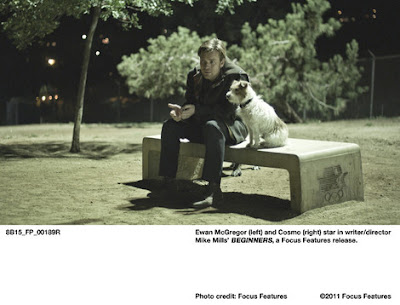OLIVER: You re-wrote Jesus' death?
HAL: It was far too violent. We need new stories.
Hal Fields (Christopher Plummer) is a seventy-five year-old man who was married for 44 years, had his son Oliver (Ewan McGregor) and, after his wife's death, told his son that he was gay, that he didn't want to be "theoretically gay," that he wanted to "explore that side of himself" and do something about it. Then he gets terminal cancer and is dying. The "essay on religion" above is part of what Hal does before he dies and is based on the real life experience recorded in Mike Mills' Beginners. Why does Hal write this "essay on religion" and what does it mean?
Hal "found an out gay priest to guide him spiritually," but Hal still re-writes the death of Jesus; for Christians, the violence of Christ's death means his Love for us, and because he loves us so much, we are bound to love ourselves properly, which means wanting what is genuinely best for ourselves and that means doing what must be done to gain eternal salvation. When Hal rewrites Jesus' death, two things happens: first, he takes away the violence, which means he takes away Christ's love for him so Hal is no longer obligated by love to do what Christ wants him to do (and denying the Resurrection of Christ, that Jesus passed away just as dawn was coming instead of Jesus being raised from the dead at dawn, denies Jesus as God and the glory of the Resurrection, so Jesus and God exist as nothing but words to take in vain) and secondly, Hal--by taking the true death away from Jesus--takes away Jesus' true identity (because our death is part of our identity and who we are).
In accordance with the US Bishop's Conference position on homosexuality, whether it is a naturally occurring or a socially adjusted behavior, homosexuals, like heterosexual singles (including myself), are called to maintain a state of celibacy and chastity. Having said that, there seems to be a trend in Hollywood that if a film wants to be controversial or an actor/actress wants to win an Oscar, all that have to do is play a bi-homosexual role and they get considered for an award (Brokeback Mountain, Boys Don't Cry, Milk, Gods and Monsters, The Black Swan, J. Edgar and Beginners). I worry that homosexuals are being exploited by Hollywood and greedy actors who want awards and companies that want the publicity of controversy, rather than a genuine concern for people in that state of existence. Christopher Plummer is a fine actor, extremely respected and accomplished in his craft, but I honestly can't see why he would have been nominated and is winning awards for playing Hal Fields except because he kisses another man in the film, and that is exploitative.
That dis-in-genuine attitude seems to be in the film, though.
When Hal "comes out," Oliver rambles off all the things he did: joined gay pride, got a boyfriend, started going to gay bars, movie night (gay films) writing congressional letters, to the point that Oliver asks him, "Is the chair gay," and Hal says, "No the chair is not gay, obviously." But Hal seems to be going through a series of steps to assure himself that he is gay and that it is okay to be gay, that there is a gay type he wants to fit into. Beginners seems to almost be mocking him and gays.
Beginners is a very serious film about a number of serious topics; while it remains ambiguous, I do feel that (not only it's fluid and organic structure and thought process) it addresses important topics in a way that many gay films have not. Anything I would say as a Catholic heterosexual will probably be considered shallow and offensive to a homosexual, but the film makes a serious attempt at showing inner-emotional and psychological problems not only within humans but the history of the U.S. as well and, with its use of art and clever dialogue construction, I just feel that, if it were going to be awarded honors, it should have been for something genuine, not just because Christopher Plummer kissed a younger man.










0 comments:
Post a Comment